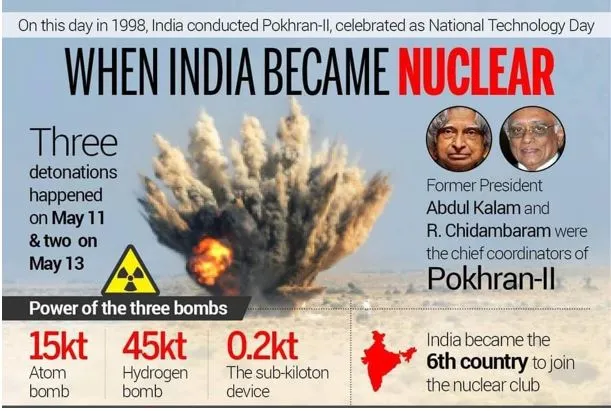

20th May 2024 (13 Topics)
Context
On May 18, 1974, India conducted its first nuclear tests under the 'Smiling Buddha' operation in Pokhran, Rajasthan. This historic event marked India's entry into the nuclear club and raised significant international attention.
Background:
- Post-World War II, global alliances shifted, leading to the Cold War between the US and USSR.
- The Nuclear Nonproliferation Treaty (NPT) was signed in 1968 to prevent nuclear weapon proliferation, with P-5 countries (China, France, Russia, the United Kingdom, and the United States) being recognized as nuclear-weapon states.
- Reasons for India's Nuclear Tests:
- India objected to the NPT's discriminatory nature and the lack of obligations for existing nuclear-weapon states.
- Domestically, Indian scientists like Bhabha and Sarabhai laid groundwork for nuclear energy research.
- Political shifts and conflicts, including wars with China and Pakistan, influenced India's decision to pursue nuclear capabilities.
Execution of Pokhran-I:
- The test yielded 12-13 kilotons of TNT and was conducted on Buddha Jayanti, the birth date of Gautam Buddha.
- No radioactivity was released into the atmosphere: The device tested was a fission device and there had been no release of radioactivity in the atmosphere.
- India became the sixth country in the World to conduct a successful Nuclear Test. It was also the first confirmed nuclear weapons test by a country outside the Five Permanent members of the United Nations Security Council.
- Aftermath:
- India faced criticism and sanctions from countries like the US post-Pokhran-I.
- International perception changed gradually, leading to discussions on India's nuclear status and entry into groups like the NSG.
- Efforts for Global Acceptance:
- India's responsible nuclear posture and diplomacy led to gradual acceptance by the international community.
- Efforts to join the NSG continue, with changing stances of various countries and opposition primarily from China.

PYQ
|
More Articles

